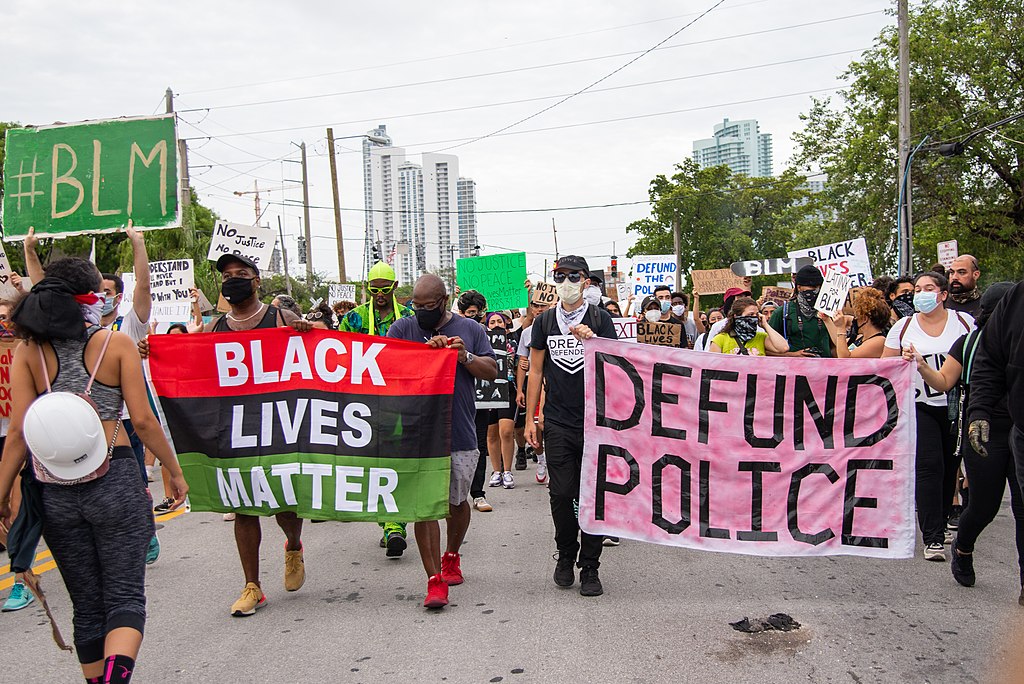Hundreds of thousands have gathered across the country this summer to protest the police killings of George Floyd, Breonna Taylor, Tony McDade and the many other Black lives taken by police brutality and white supremacy. Protestors have been met with violence, mass arrests and more recently, shameful rhetoric from Republican lawmakers and others who claim that protests will be to blame for a second wave of COVID-19 infections.
Not only does this contention ignore the precautions taken by organizers to prevent the spread of COVID-19 during outdoor protests, it disregards the urgency of the protests.
The mere presence of militarized police within Black communities contributes to adverse health outcomes.
Police presence and white supremacy have historically caused, and continue to produce, adverse health outcomes. Protests that seek to defund the police are therefore a necessary response to the systemic racism that has resulted in disproportionate violence and COVID-19 in Black communities.
The mere presence of militarized police within Black communities contributes to adverse health outcomes. The prevalence of poor-to-fair health, diabetes, high blood pressure and past-year asthma episodes is higher in neighborhoods where police encounters are more likely to result in frisking. Not all of these health outcomes are attributable to policing. But police encounters where force is used—which overwhelmingly affect Black or Latino men—result in poor-to-fair perceptions of one’s general health, or increased likelihood of an asthma episode, besides the direct harms of violence.
This is where the idea of reform fails: Even if police are banned from using force and made to wear body cameras, even if stop-and-frisk practices are made illegal, their very presence in Black communities is detrimental to the overall wellbeing of the community.
Shifting funds away from police departments and toward other agencies—especially those that focus on health, education and housing—is essential. And protests that seek to remove police from Black communities and divest from policing are vital for public health.
Another immediate concern is that COVID-19 is disproportionately affecting Black communities—as a direct result of the systemic racism that these protests seek to dismantle.
For a population already so hard-hit, taking precautions is a significant priority—it has to be. Correct and widespread mask usage at marches has been well-documented. Organizers have made it a priority to distribute masks to protesters to prevent the spread of COVID-19, at a rate that could put state governments to shame.
If COVID-19 cases do arise from protests, they are more likely the result of tear gas deployment by law enforcement that causes individuals to cough and remove PPE, or of mass arrests that force people into small, enclosed spaces for hours.
Future COVID-19 case spikes are likely to be the result not of protests but of rushed re-openings, which put both service workers and customers at risk by not making mask-wearing in public mandatory.
The cost of one riot gear load could outfit 55 front-line healthcare workers with personal protective equipment.
The current protests and the demands of Black organizers to defund and divest from the police are necessary to protect the health of Black communities, both in the midst of a pandemic and beyond. Imagine the effects of defunding the police and having the money for their gear go to healthcare workers fighting an unprecedented pandemic that has hit Black communities hardest: The cost of one riot gear load could outfit 55 front-line healthcare workers with personal protective equipment (PPE).
Defunding the police encapsulates a variety of strategies that reduce both the tools police have at their disposal and the overall scale of policing, while also ensuring funds go elsewhere. Capping overtime accrual and overtime pay for military exercises, for example, stops police from increasing in capacity and lessens their reach in Black lives and communities.
Defunding the police means fewer officers and lessened presence within communities, meaning improved physical and mental health for Black communities. The process of defunding includes the removal of police from schools, and the subsequent installation of counselors using repurposed funds, thus disrupting the school-to-prison pipeline and providing much-needed mental health support for students.
Divesting from the police also takes the power away from one incredibly damaging piece of the carceral system that seeks to punish, not heal. This is key for the protection and longevity of Black communities, and it must happen now.
The author is an intern at the Drug Policy Alliance; DPA has previously provided a restricted grant to The Influence Foundation, which operates Filter, to support a Drug War Journalism Diversity Fellowship.
Photograph of a protest in Miami in June 2020 by Mike Shaheen via Wikimedia Commons/Creative Commons 2.0





Show Comments